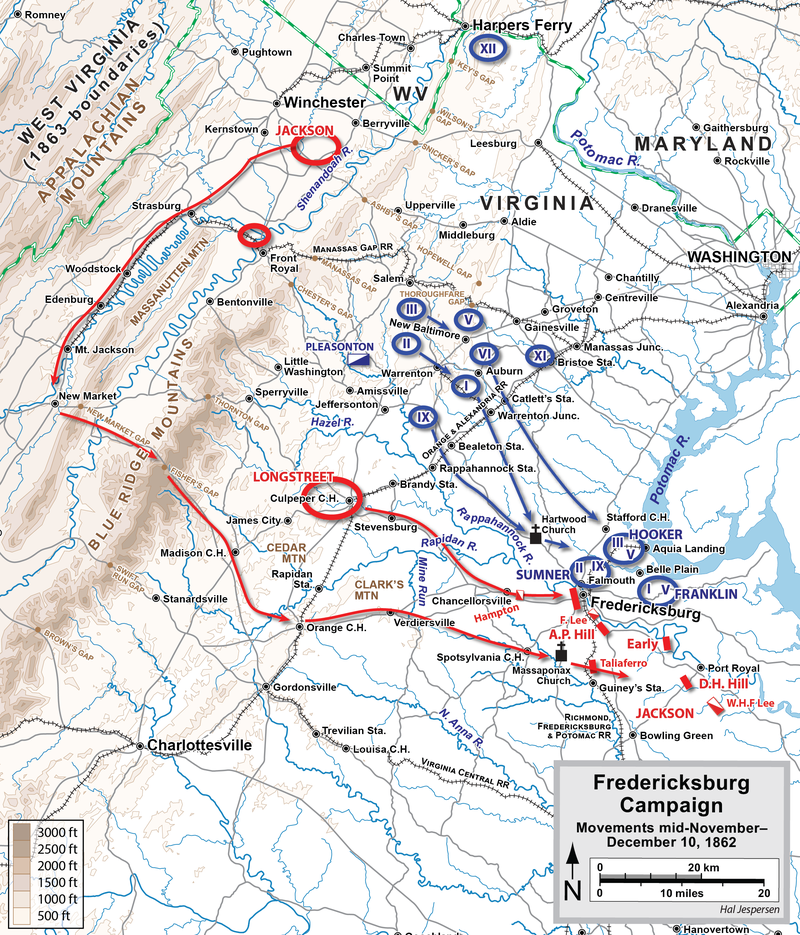
FROM WIKIPEDIA COMMONS
The Battle of Fredericksburg was fought December 11–15, 1862, in and around Fredericksburg, Virginia, in the Eastern Theater of the American Civil War. The combat, between the Union Army of the Potomac commanded by Maj. Gen. Ambrose E. Burnside and the Confederate Army of Northern Virginia under Gen. Robert E. Lee, included futile frontal attacks by the Union army on December 13 against entrenched Confederate defenders along the Sunken Wall on the heights behind the city. It is remembered as one of the most one-sided battles of the war, with Union casualties more than twice as heavy as those suffered by the Confederates. A visitor to the battlefield described the battle to U.S. President Abraham Lincoln as a “butchery”.
Burnside’s plan was to cross the Rappahannock River at Fredericksburg in mid-November and race to the Confederate capital of Richmond before Lee’s army could stop him. Bureaucratic delays prevented Burnside from receiving the necessary pontoon bridges in time and Lee moved his army to block the crossings. When the Union army was finally able to build its bridges and cross under fire, direct combat within the city resulted on December 11–12. Union troops prepared to assault Confederate defensive positions south of the city and on a strongly fortified ridge just west of the city known as Marye’s Heights.
On December 13, the Left Grand Division of Maj. Gen. William B. Franklin was able to pierce the first defensive line of Confederate Lt. Gen. Stonewall Jackson to the south, but was finally repulsed. Burnside ordered the Right and Center Grand Divisions of major generals Edwin V. Sumner and Joseph Hooker to launch multiple frontal assaults against Lt. Gen. James Longstreet‘s position on Marye’s Heights – all were repulsed with heavy losses. On December 15, Burnside withdrew his army, ending another failed Union campaign in the Eastern Theater.
TODAY’S ALMANAC
Bill of Rights Day (U.S.)
Question of the Day
Advice of the Day
Home Hint of the Day
Word of the Day
Puzzle of the Day
Born
- Gustave Eiffel (architect) – 1832
- Betty Smith (novelist) – 1896
- Muriel Rukeyser (poet) – 1913
- Tim Conway (comedian & actor) – 1933
- Stuart Townsend (actor) – 1972
- Adam Brody (actor) – 1979
Died
- Sitting Bull (Sioux Chief) – 1890
- Dick Stuart (also known as Dr. Strangeglove, baseball player) – 2002
Events
- The Bill of Rights, first ten amendments to U.S. Constitution, ratified– 1791
- Fire at the U.S. Patent Office– 1836
- Philadelphia streets were first cleaned by a machine– 1854
- Battle of Fredericksburg ends in defeat of union troops by Confederate General Robert E. Lee (Civil War)– 1862
- Groundbreaking ceremonies for the Jefferson Memorial took place in Washington D.C.– 1938
- Gone With the Wind premiered, at Loew’s Grand Theater in Atlanta, Georgia– 1939
- Commemorative stamp depicting Echo I, world’s first passive communications satellite, issued by U.S. post office, D.C., 1960– 1960
- First rendezvous of two manned spacecraft, Gemini 6 and Gemini 7– 1965
- Venera 7 Soviet unmanned spacecraft landed on Venus– 1970
- Superman, starring Christopher Reeve, premiered– 1978
Weather
- An intense cold front swept the East Coast, dumping heavy rain on Louisiana and heavy snow on the Northeast– 1901
- Great Blizzard hit the Prairie provinces– 1964
- O’Hare Airport in Chicago was closed because of high winds and heavy snowfall– 1987
- Approximately 1.5 million homes and businesses in Washington and Oregon were without power after windstorms and heavy rains caused flooding, several deaths and closed two major bridges– 2006
COURTESY www.almanac.com

You actually make it seem really easy with your presentation but I in finding this topic to be really one thing which I feel I’d never understand. It seems too complex and very broad for me. I am having a look ahead for your subsequent put up, I will attempt to get the cling of it!